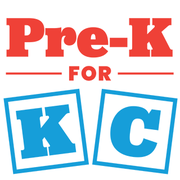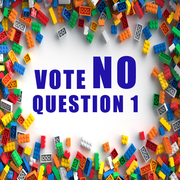Kansas City, Missouri, Question 1, Sales Tax for Early Childhood Education (April 2019)
| Question 1: Kansas City Sales Tax for Early Childhood Education |
|---|

|
| The basics |
| Election date: |
| April 2, 2019 |
| Status: |
| Topic: |
| Local sales tax Expires in: 10 years |
| Related articles |
| Local sales tax on the ballot April 2, 2019 ballot measures in Missouri Jackson County, Missouri ballot measures Other counties Local education on the ballot |
| See also |
| Kansas City, Missouri |
A sales tax initiative was on the ballot for Kansas City voters in Missouri, on April 2, 2019. It was defeated.
| A yes vote was a vote in favor of authorizing the city to enact a 0.375 percent sales tax for 10 years to fund pre-K, early childhood center improvements, and early childhood education staffing. |
| A no vote was a vote against authorizing the city to enact a 0.375 percent sales tax for 10 years to fund pre-K, early childhood center improvements, and early childhood education staffing. |
Question 1 was designed to levy a citywide sales tax to fund pre-K instruction for more than 5,400 four- and five-year-olds living within the boundaries of Kansas City, according to the initiative's full text. Approval of the measure would have dedicated sales tax funds to early childhood education centers and the city's early childhood education workforce. The tax would have been applied to retail sales of taxable items and services in Kansas City for 10 years beginning on October 1, 2019. Under the initiative, a five-member economic development tax board would have been established to oversee expenditures.[1]
Question 1 was on the ballot in Cass County, Clay County, Jackson County, and Platte County, Missouri.
Election results
|
Kansas City Question 1 |
||||
|---|---|---|---|---|
| Result | Votes | Percentage | ||
| Yes | 19,138 | 34.04% | ||
| 37,077 | 65.96% | |||
Text of measure
Ballot question
The ballot question was as follows:[2]
| “ |
Shall the City of Kansas City impose a sales tax authorized by Section 67.1305 of the Revised Statutes of Missouri for a period of 10 years at a rate of 3/8% to be used for economic development purposes through funding Pre-K instruction for four and five year olds the year before they enter kindergarten, funding improvements to early childhood centers, and investing in the City’s early childhood education workforce?[3] |
” |
Full text
The full text of the initiative is available here.
Support
Proponents
- Progress KC led the campaign in support of the initiative, known by proponents as Pre-K for KC.[4]
- A list of endorsements for the support campaign can be viewed here.
- Kansas City Mayor Sly James campaigned in favor of the initiative.
- The following city council member stated in The Kansas City Star that she supported Question 1:[5]
Arguments
Progress KC stated the following in favor of Question 1 on its website:[6]
| “ |
Investing in high-quality pre-K for Kansas City’s kids will pay off for us in both the short and long term. There is literally no better way to invest our resources. What’s more, the program will be independently evaluated for effectiveness and voters can decide whether to renew it after 10 years. When we invest in pre-K, we ensure our students are ready to learn when they enter the K-12 system. We provide them with education during a critical time in their brain development. We also enjoy future benefits like reduced juvenile crime, a better prepared workforce, and a strong return on our investment of $7 in savings for every $1 we invest.[3] |
” |
| —Progress KC | ||
Mayor Sly James made the following argument in favor of Question 1:[4]
| “ |
When I took office in 2011 only 33% of Kansas City third graders could read at the appropriate grade level. Today it’s up to 55%, which is better, but still behind the state average of 62%. This is an urgent problem for us because research tells us that third grade reading proficiency is a predictor for success later in life. Kids who can’t read at a third grade level by the third grade usually end up slowly slipping through the cracks. I’m not going to leave office without doing something about it.[3] |
” |
| —Mayor Sly James | ||
Opposition
Opponents
- Vote No KC Question 1 led the campaign in opposition to the initiative.
- A list of organizations in opposition to Question 1 can be viewed here.
- The following city council members stated in The Kansas City Star that they opposed Question 1:[5]
Arguments
Vote No KC Question 1 made the following arguments against the initiative on its website:[7]
| “ |
|
” |
| —Vote No KC Question 1 | ||
Path to the ballot
This measure was put on the ballot through a successful citizen initiative petition drive.
Alvin Brooks, Maria Chaurand, Leslie Fields, Ed Ford, Seft Hunter, Dwon Littlejohn, George Lopez, and Mary Spence filed the petition for Question 1. The signature requirement to place initiatives on the ballot in Kansas City is 5 percent of the total votes cast for mayoral candidates at the preceding regular municipal election. To place an initiative on the ballot for April 2, 2019, the required number of signatures was 1,708. Proponents submitted signatures for the initiative, of which 1,984 were validated by the city clerk's office on August 3, 2018.[1]
See also
External links
Support |
Opposition |
Footnotes
- ↑ 1.0 1.1 Kansas City City Clerk, "Ordinance 180565," accessed March 6, 2019
- ↑ Kansas City Board of Election Commissioners, "Sample Ballot," accessed March 3, 2019
- ↑ 3.0 3.1 3.2 3.3 Note: This text is quoted verbatim from the original source. Any inconsistencies are attributable to the original source.
- ↑ 4.0 4.1 Progress KC, "Pre-K for KC," accessed March 6, 2019
- ↑ 5.0 5.1 The Kansas City Star, "Mayoral Q&A: Only one candidate supports Mayor James’ plan for expanded pre-K," March 3, 2019
- ↑ Progress KC, "Why Vote Yes," accessed March 6, 2019
- ↑ Vote No KC Question 1, "Reasons Why," accessed March 6, 2019
State of Missouri Jefferson City (capital) | |
|---|---|
| Elections |
What's on my ballot? | Elections in 2025 | How to vote | How to run for office | Ballot measures |
| Government |
Who represents me? | U.S. President | U.S. Congress | Federal courts | State executives | State legislature | State and local courts | Counties | Cities | School districts | Public policy |






